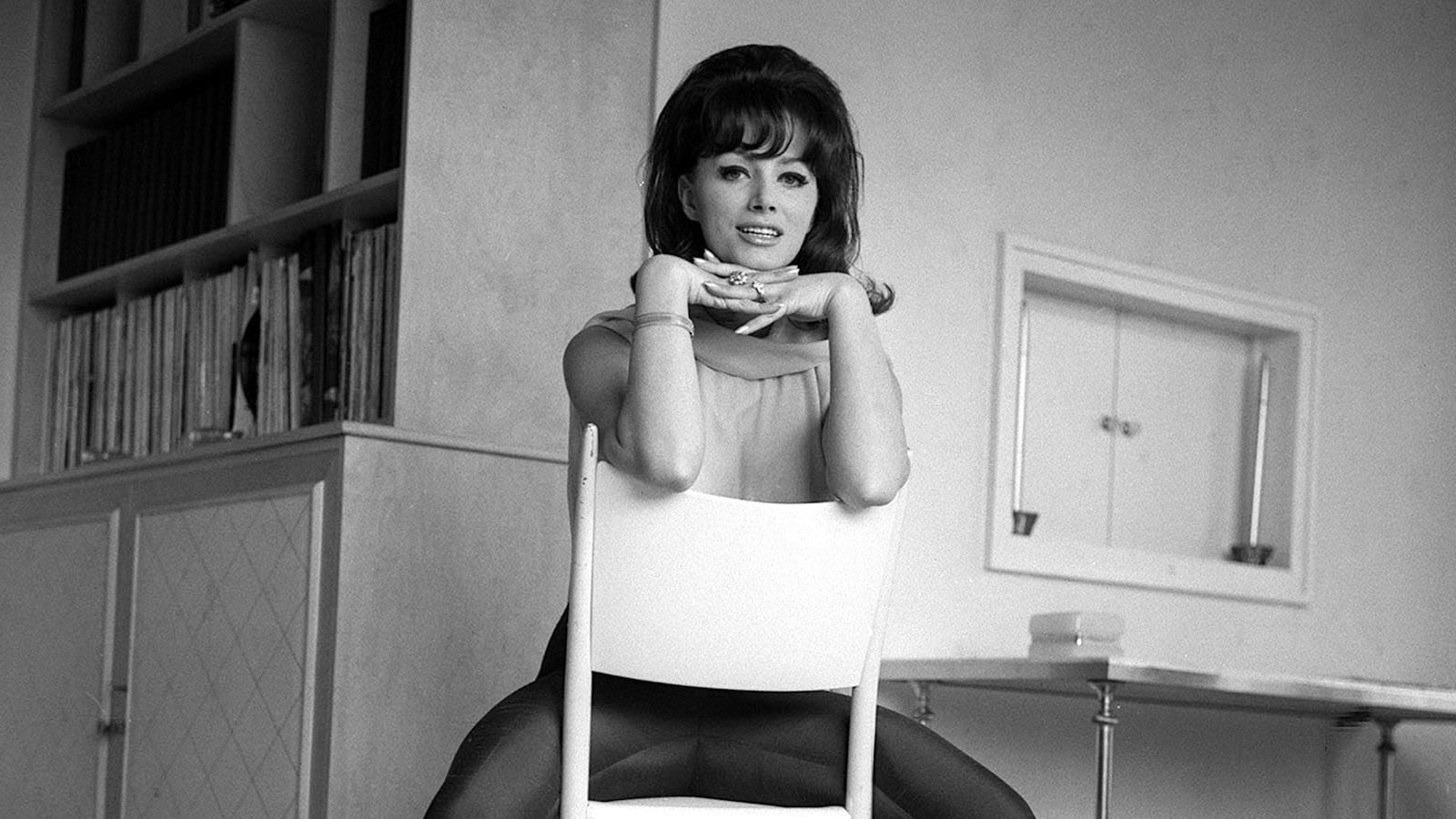Much has been written over the last days about Jackie Collins. That she penned, in long hand, 32 New York Times best-sellers, and five of them after being diagnosed with the breast cancer that eventually killed her.
That she trailblazed a certain tell-all, Confess-It Lit that presaged reality TV and had her Hollywood peers, and the world, scanning her pages, looking anxiously for themselves and their friends and enemies there.
That she was the mother of chick lit—she wasn’t, Jackie’s was more like Clit Lit, but more of that later—and she was one of the ones who paved the way for all the others, including E.L. James.
Collins was irresistibly outspoken in interviews, so along with these descriptions and analyses, her spoken words and sense of story reverberate in the post mortem.
“I love when you see the movie-star guy [at a premiere], and there’s this woman standing two steps behind him, looking at him adoringly, and you know she hates his guts. She’s thinking, ‘Why isn’t it me up there?’” she observed gleefully in an interview in 2014.
But the best way to understand Jackie Collins—author who knocked it out of the park again and again, seller of half a billion books, promulgator of a certain dream, instigator in leopard print sluttire, novelist—is to read her words as she wrote them. In the beginning.
[Claudia] snuggled up closer to David. “Let’s forget about the movie. Let’s go back to my place and screw. I feel like getting laid, again, don’t you?...I want to do what I want to do, whenever I want. No ties, no strings. I don’t want to get married, it means nothing to me.
These particular words are from her 1968 debut, The World Is Full of Married Men. With it, Collins lobbed a hand grenade—an unlikely, explosive assemblage of the ideas of Betty Friedan, Helen Gurley Brown, Masters and Johnson, and Norman Mailer—into the living rooms and bedrooms of women still in the process of awakening from the deep sexual slumber and stiflingly scripted gender roles of the ’50s and ’60s.
Yes, the FDA had approved the Pill in 1960, but it wouldn’t be legal for unmarried women, giving license in the true sense, until 1972.
Gloria Steinem had yet to become the public face (and racehorse legs) of a kind of mainstream, glamour-tinged feminism.
Mailer was playing an anti-war genre game (Armies of the Night), Myra Breckinridge brought homosexuality, drugs, and trans life to the table, and Valley of the Dolls had titillated women with its campy rendering of female decadence, desire, and depression.
But it was The World Is Full of Married Men that was the swift kick in the ass, its depiction of female desire undeniably, surprisingly out there for its moment. Sort of Harold Robbins turned inside out, Married Men, which had much more to say about married women, kicked off Collins’s remarkably long and prolific career and set out the tropes and concerns she returned to again and again, from Hollywood Lives to her Lucky Santangelo series about a mobster’s daughter who eventually becomes Queenpin of the Vegas casino world.
Its prequel, Confessions of a Wild Child, is about Lucky as just that (Collins was no fool and knew she needed younger readers).
The protagonists of Collins’s stories invariably want happiness, fulfillment, glamour, and sex. Lots and lots of sex.
But like The World Is Full of Married Men, that’s just the beginning.
Take David’s wife, Linda, a mother of two. While David is busy with Claudia, Linda is also busy, with a much younger man she has met at a protest rally she attended on a whim, dressed in Chanel (it’s so Jackie!):
He began to kiss her back, and then she was suddenly lost in a raging passion which seemed to go on forever and ever…. It was good to be wanted.
Hell, yes, it was. And is. In this passage and forever after, Jackie Collins knew and wrote about the fact that the desire to be desired by a man was actually equally the desire for something else: power. Naked, raw, ambitious, unladylike, phallic, take no prisoners power.
In The World Is Full of Married Men—a title that suggests nothing so much as a hungry woman considering a menu of them prepared in any number of different, delicious, and enticing ways—Collins was setting about her first fictional testing of a notion: that being wanted by a man, making him want you, wanting him back, taking what you wanted, being taken, was not some cat and mouse-y means to its own end.
No. It was also something much bigger, much more thrilling, and also much messier and more dangerous—a way to reset not just relationships between men and women, but the playing field of the world.
Consider David and Claudia, this time stealing a moment together in a closet during a work function that Linda is attending. Claudia initially objects to doing it within feet of David’s wife and co-workers. But she relents:
“Oh David,” [Claudia] whispered, “You like to take chances.” He cupped her breasts in his hands and bent to kiss them. She moaned, “Go on then, you son of a bitch. Do whatever you want, I don’t give a damn!”
In an exchange like this, in a dalliance like the one between David and Claudia, the question, once we get past the clichés and commerciality and datedness of the language, is not just contemporary, but radical: not so much Who has the power but What is power? Who’s taking whom?
David can go ahead and do whatever he likes—Claudia has said as much—so what is his power, anyway? Poof, and it’s gone. Tricked out in a garter belt and stockings, literarily and figuratively speaking, Collins was nevertheless not unlike the angry, pranking author who would exhort us to Steal This Book three years later. She had an agenda to subvert.
Like Updike in his novel Couples, published the same year as Married Men, Collins wanted to push at what was really happening, or not happening, in married people’s bedrooms, and in their affairs, and ask what it all meant, and use it to sell books.
But Collins wanted to get at what women wanted, and she wasn’t content to leave it at meddlings into and manipulations of the libidos of others, moving them around on the chessboard of her novels or, as has been suggested about Updike, in life.
Collins was more about upending the chessboard and sending all the pieces scattering without ever seeming to.
Her novels may have seemed Harlequin-ish, but way beyond “loving with a vengeance” as the feminist literary critic Tania Modleski has suggested Harlequin heroines do, Jackie’s fuck with a vengeance. They do it for pleasure, for power, and for fun.
Of course men weren’t going to like it, necessarily. Especially nearly half a century ago. Social change of the kind that interested Collins, and the male response to it, is thematized in The World Is Full of Married Men, when David picks up the morning newspaper and sees, to his horror, a photo of Linda, the mother of his children, toppled over in the rough and tumble of a rally, her designer skirt hitched nearly to her waist:
David drove away [the morning after an overnight tryst with Claudia], his face grim. He envisioned what he would say to Linda. The whole thing was so utterly ridiculous. His wife at a protest meeting! It was ludicrous. She didn’t know anything about politics or bombs. The kitchen, the children, and social activities such as tea with the girls and dinner out twice a week were her province. Ban the Bomb indeed! Who did she think she was?
The answer is that like women everywhere in 1968, Linda isn’t sure. It’s no coincidence that she has sex with a man she meets at a protest.
Linda is just finding her way to a life a little more like Claudia’s—daring and revolutionary precisely because it involves being newly matter of fact about sex, desire, and power. Welcome to Jackie’s world.
But as one might guess, these rearrangements—internal revolutions, if you will—aren’t easy. And here is Linda, married, unsatisfied for reasons she can’t place, feeling Friedan’s “problem without a name,” and acting on it by being a sexual agent.
After, she waits for Paul to call her, dreading equally the possibilities that her husband will intercept the call, and that there won’t be a call:
She…[was] half angry and half relieved that Paul hadn’t phoned. She desperately wanted him to, otherwise, what had it all been? A quick one night affair?...However, if he did phone, she wanted to tell him that she couldn’t possibly see him again, that it had all been a big mistake…At least that way she would be regaining a small amount of self-respect by denying herself something she really wanted.
The road to Claudia, to fucking less like a wife and more like a woman or a man, is littered with self-reproach and false starts and confusing, circular logic.
Collins knew that like her protagonists, real women wanted sex, really really wanted it. That acknowledgment in itself was groundbreaking. But Collins did more. She suggested that while sex was pleasure, and that there was nothing wrong with that, and that in fact pleasure was good, it wasn’t just pleasure. Sex was all tied up with power, ownership, control. What people rejected from The Feminine Mystique they might just accept in a highly commercial women’s novel.
In a very real way, Collins was about stealth social change. What’s at stake, precisely, between David and Claudia when he sees her with another, more powerful man at a nightclub?
“You’re drunk,” he said [to Claudia] in disgust. “You’re acting like a cheap whore.”
She looked at him coldly. “Shut up. You make me sick. You’re just jealous, that’s all. The only time you act sweet is when you’ve got a hard-on!”
He wanted to slap her. She sat there, glaring at him, and for one lucid moment he saw not his beautiful Claudia, but a hard calculating face over a well developed, highly exhibited body.
“Your tits are hanging out!” he said.
“So?” she replied. “Why not? Are you the only one that’s supposed to see them?”
Good question. And from the very beginning, the crux of things for Collins—that nexus of sexual, personal, and political that feminists have continued to mine for four and a half decades since.
Jackie’s protagonists pursued liaisons that were non-monogamous, non-dyadic, unapologetic, unrestrained. They were mistresses and wives and mothers and they were frequently also appetitive, reckless, pleasure-seeking, and selfish.
The female libido, even in 1968, was never something passive and pliant for Collins. In her hands, it was transformative, surprising, and dangerous. Like an alchemist, she handled it with care and great respect for its power.
And so again and again, book after book, she got you to turn the page. Oh, about the criticism and contempt—from feminists, reviewers, and lovers of more literary fiction? Like Claudia, Collins didn’t give a damn. She had an agenda. In her own words:
“Barbara Cartland said to me, ‘Oh, Miss Collins, your books are filthy and disgusting and you are responsible for all the perverts in England.’ I paused for a few moments and said, ‘Thank you.’”
“Not bad,” as Collins loved to say of her career and herself, dialing down her power to play it up, “for a school dropout.”
Deng Xiaoping was so scandalized by her work that he called for the execution of her publishers in 1988, according to the LA Times. She gave a lot of people a lot of pleasure, a sentiment she said she wanted engraved on her tombstone. And so her work here is done.
But wherever she is, Jackie Collins is just getting started. And waiting for the rest of the world to catch up.




